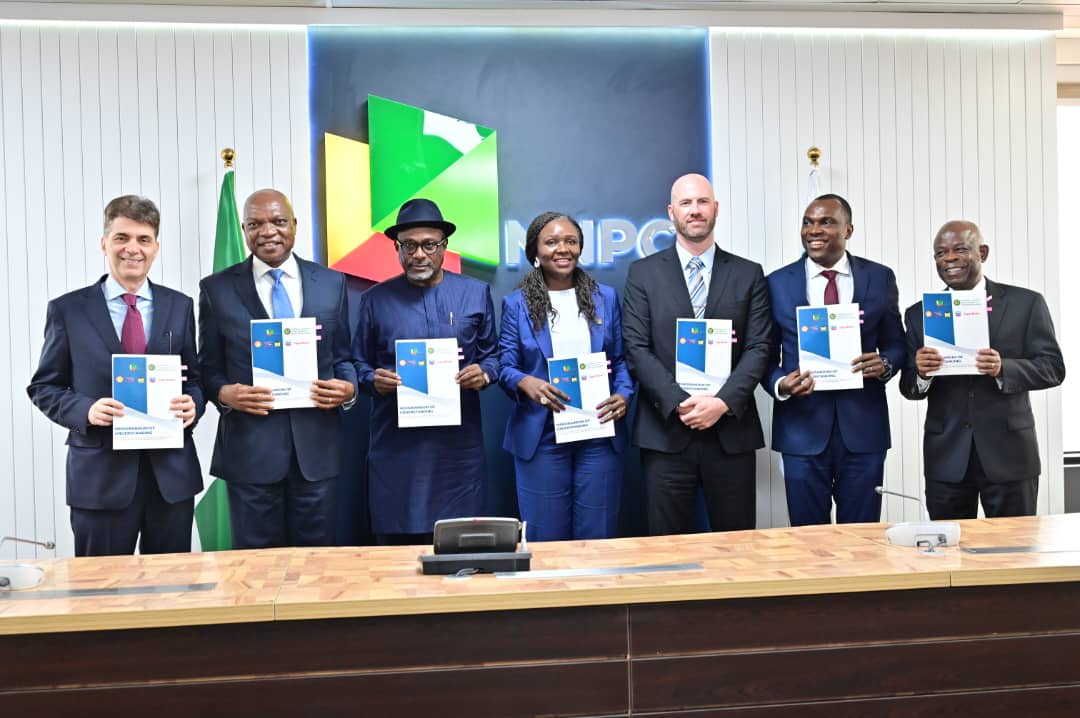NNPC, NCDMB, IOCs sign MoU to reduce contracting cycle
The Nigerian National Petroleum Company Limited (NNPC Ltd) has signed a Memorandum of Understanding (MoU) with the Nigerian Content Development and Monitoring Board (NCDMB) and international oil companies for an optimal contracting cycle in the industry.
The MoU will implement an industry framework focused on processes and timelines for achieving an optimal contracting cycle of not more than 180 working days in the Nigerian petroleum industry.
Speaking at the signing of the MoU on Monday in Abuja, Mele Kyari, group chief executive officer, NNPC Ltd., listed key benefits of the framework in the MoU.
Represented by Oritsemeyiwa Eyesan, executive vice president, upstream, NNPC Ltd, Mr Kyari included a reduction of the contracting cycle for open competitive tender, selective tender, and single sourcing tender to 180, 178, and 128 working days, compared to the current best effort performance of 327, 333, and 185 working days, respectively.
“An optimised contracting cycle is expected to improve the ease of doing business, reduce cost, and drive efficiency, which will eventually translate to production growth, increased revenues, and ultimately improved profitability.
“You will agree that one of the biggest challenges in the industry is contracting. And we see this as an enabler to increase production in the sense that once you have your contracts in place, nothing stops you from performing.
“Today, we have witnessed a collaborative effort by all the major stakeholders. We have come together to reaffirm that we are ready to work together to shorten the timeline for contracting, and you can imagine reducing 320 days to 180 days. That is monumental.
“So efficiency is going to be instilled in the process and will ultimately deliver more production. We will deliver cost-efficient operations and boost the economy,” he said.
The GCEO described the MoU as a collaborative solution between the major industry players for the double-digit economic growth rate agenda of the government and to generate tremendous value for all stakeholders, including investors, companies, and the community.
Also speaking, Simbi Wabote, executive secretary, NCDMB, recalled that the 15-day rule for the industry was introduced in 2017 and later formalised with Service Level Agreement (SLA) in May 2017 with NLNG, leading to record-breaking approvals in respect of the NLNG Train7 project.
Mr Wabote said the industry found the outcome impressive, leading to the Independent Petroleum Producers Group (IPPG) signing the SLA in 2018 and the Oil Producers Trade Section (OPTS) thereafter.
He expressed delight that NNPC Ltd. has now joined as a key party to the agreement as the senior partner of the Joint Ventures and concessionaire of the Production Sharing Contract (PSC) arrangements.
“The overall goal is to wrap up our tendering to contract award processes within six months. I have no doubt that this is doable with all key parties now on board with today’s execution of the SLA.
“This SLA will not be an exception, as you can count on us to deliver our part of the deal,” he said.
In a remark, Osagie Okunbor, managing director, Shell Nigeria, expressed satisfaction over the development in view of the long time the issue, which was consistent, had taken before being actualised.
Mr Okunbor, while stating its commitment, said that apart from the MoU framework, the enablers were critical and should be seen as an attachment to the MoU, adding that work on the enablers should be concluded immediately after the MoU endorsement to ensure a six-month contracting cycle.
CEOs and representatives from other IOCs, including ExxonMobil, Chevron Nigeria, TotalEnergies, and ENI, also endorsed the MoU framework and expressed willingness towards an effective implementation.
Earlier, Bala Wunti, chief upstream investment officer, NNPC Ltd., said in an overview that three things identified as the major challenges of the sector were the struggle to convert PIB to PIA, which had been settled, security issues that had made business ineffective, and cost elements that could be addressed through contracting.
Also Read: Fear In NNPC As Dangote Struggles To Get Approval To Operate Refinery
These, he said, made the sector globally uncompetitive; hence, the current industry collaborations on the MoU framework became necessary to tackle the problems.
“We have worked over one month, and our team of experts in supply chain compliance and other supporting professionals will generate Service Level Agreement (SLA) to be executed differently from the previous SLA between the stakeholders to accelerate the contracting timeline,” Mr Wunti said.
The framework is in line with the Nigerian Upstream Cost Optimisation Programme (NUCOP), and in consonance with President Bola Tinubu’s directive for NNPC Ltd. and NCDMB to engage the industry with the objective of improving performance.
As a demonstration of his resolve to the efficiency mandate in the PIA, Mr Kyari took the lead in constituting an industry joint committee (IJC) comprising NNPC Ltd, NCDMB, and IOCs to develop an industry framework for an optimised contracting cycle.
(NAN)













